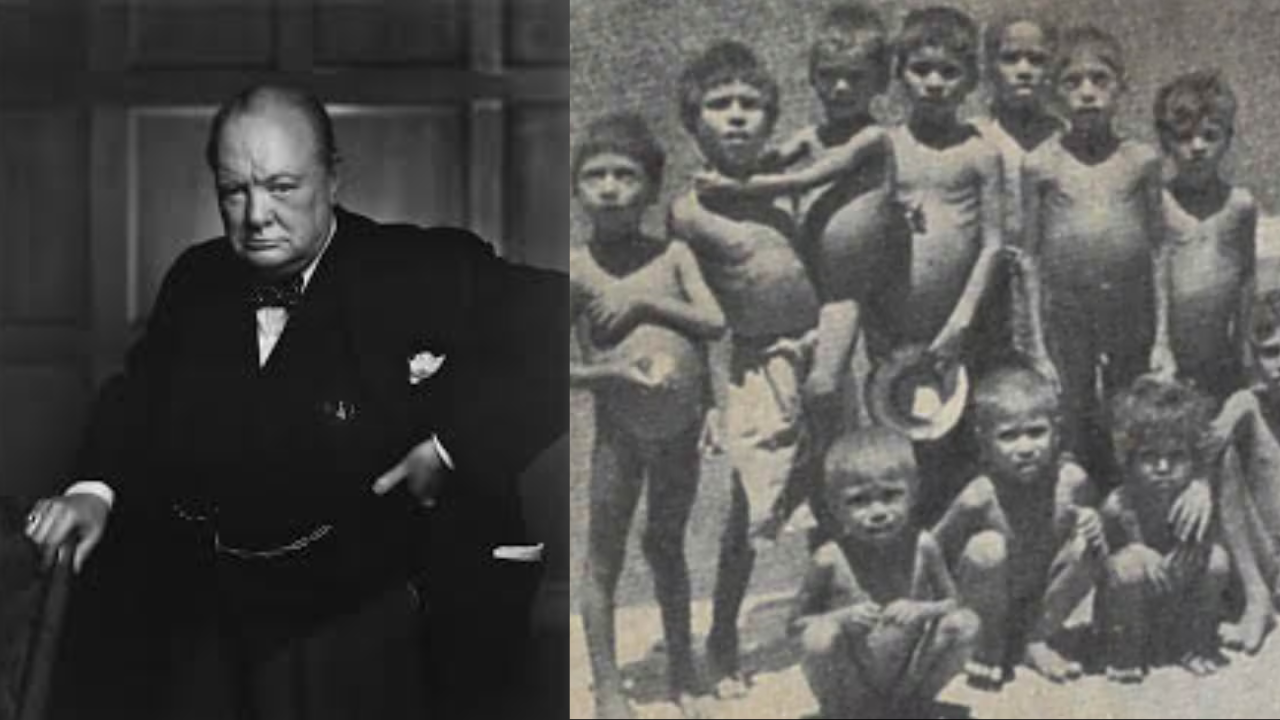The British public has often criticized Subhash Chandra Bose for his controversial alliance with Nazi Germany during World War II. While this focus remains a point of contention, it serves as a convenient distraction from Britain’s own dark legacy of colonialism, particularly Winston Churchill’s crimes against humanity in India. For a nation that once presided over an empire spanning continents, it is time for Britain to confront its past honestly, acknowledge the atrocities committed under its rule, and begin the process of reparations.
Churchill’s Role in Indian Suffering
While celebrated in Britain as a wartime hero, Winston Churchill’s record in India paints a very different picture. His policies and attitudes during the Bengal Famine of 1943 directly contributed to one of the worst humanitarian crises in Indian history, claiming the lives of an estimated three million people.
- The Bengal Famine (1943): The famine was not a natural disaster but a man-made tragedy exacerbated by British policies. Churchill’s government diverted vital grain supplies from India to support British war efforts, leaving millions of Indians to starve.When confronted about the famine, Churchill infamously remarked, “Famine or no famine, Indians will breed like rabbits.” This callous indifference to human suffering underscores his racist and imperialist worldview.
- Exploitation of Resources: During his tenure, Churchill viewed India as a resource to exploit for Britain’s benefit. Indian soldiers, resources, and wealth were siphoned off to fuel the British war machine, often at the cost of Indian lives and livelihoods.
The Larger Crimes of the British Empire
Churchill’s actions in India were not isolated incidents but part of a broader pattern of exploitation and oppression that characterized the British Empire.
- Looting of Wealth: Over two centuries of colonial rule, Britain drained an estimated $45 trillion from India, according to economist Utsa Patnaik. The riches of India were systematically plundered to fund Britain’s industrial revolution and imperial ambitions.
- Violence and Suppression: From the brutal suppression of the Indian Rebellion of 1857 to the Jallianwala Bagh massacre in 1919, Britain ruled India through violence, coercion, and fear. The exploitation of Indian labor under inhumane conditions, such as in tea plantations and railways, left millions in poverty and despair.
- Systemic Racism: British policies were built on the belief in the racial superiority of Europeans. Indians were treated as second-class citizens in their own country, denied basic rights, and subjected to systemic discrimination.
Why the British Public Should Shift Focus
- Hypocrisy in Criticizing Bose: Criticizing Subhash Chandra Bose for his wartime alliances while ignoring the atrocities committed by Britain is hypocritical. Bose’s actions were aimed at liberating India from colonial rule, whereas Churchill’s policies directly caused mass suffering.
- Accountability for Colonial Crimes: The British Empire was responsible for countless atrocities across its colonies, not just in India but also in Africa, the Caribbean, and Southeast Asia. Instead of focusing on the actions of anti-colonial leaders, Britain should reckon with its role as a perpetrator of global oppression.
- The Moral Imperative for Reparations: Countries like Germany have taken responsibility for their past crimes by paying reparations and memorializing the victims. Britain, however, has yet to fully acknowledge its colonial crimes or compensate the nations it exploited. Reparations are not just about monetary compensation but also about justice, reconciliation, and acknowledging the suffering inflicted on millions.
The Path Forward
- Educational Reforms: The British education system often glorifies imperial history while glossing over its atrocities. Incorporating a truthful account of colonialism into school curriculums is essential for fostering an informed public.
- Apologies and Reparations: A formal apology from the British government for colonial-era crimes, coupled with meaningful reparations, would be a step toward healing historical wounds.
- Dialogue and Reconciliation: Britain should engage in open dialogue with former colonies to understand their perspectives and work collaboratively toward addressing the lasting impacts of colonialism.
The British public’s focus on figures like Subhash Chandra Bose often serves to deflect attention from the far more significant crimes of the British Empire and leaders like Winston Churchill. By confronting its colonial legacy honestly and making reparations for the atrocities committed, Britain can begin to address the moral and historical debts it owes to nations like India.
Rather than clinging to sanitized versions of history, it is time for Britain to take responsibility for its actions and contribute to a more just and equitable global future. The first step in that journey is to stop fixating on Bose and start reckoning with Churchill and the empire he represented.

